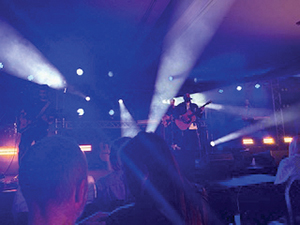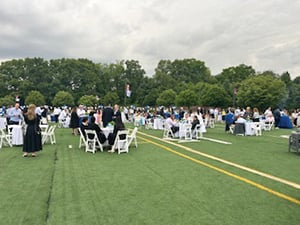
On the evening of May 14, Yom Ha’Atzmaut, Yeshivat Frisch hosted a Mangal—Israeli-style barbecue—on their Great Lawn in Paramus. Following the Mangal was a concert given by Akiva Turgeman, a rising dati Israeli rock star. The evening was attended by Frisch parents and some alumni; Frisch had held its Yom Ha’atzmaut event for students the previous night. This event was a low-key substitute for the Frisch dinner, which did not take place this year.
Frisch’s Principal Rabbi Eli Ciner shared, “When we realized that this year’s dinner had to be different, we reflected, we thought, we met, and decided that the only way we could meet as a community was if we did it on Yom Ha’Atzmaut—when we are not only celebrating Medinat Yisrael, but celebrating our alumni who are protecting her.” The purpose of the evening was to gather as a community to honor Frisch’s chayalim, daven for the hostages and soldiers, and to celebrate the State of Israel. Akiva’s concert was intended to be a part sing-along, to sing for the peace and security of Israel and the Jewish people worldwide.
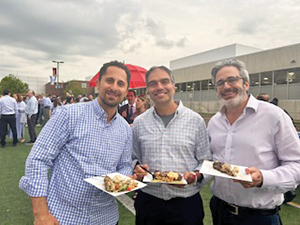
The barbecue featured Israeli-style food, and the guests mingled in business casual attire, enjoying the mild breeze. “This is an inspirational evening,” said Joe Toledano, a Frisch parent of two.
“It’s nice that this year they decided to do something so meaningful—connecting with Israel on Yom Ha’Atzmaut,” said Gerald Cohen, another Frisch parent. “Israeli food, having an Israeli singer—I think it’s very appropriate and I’m happy to be a part of it.”
After Mincha, the guests were ushered downstairs to the auditorium. Dr. Ed Lubat, the president of the board of trustees, addressed the crowd. “Rabbi Lord Jonathan Sacks, zt”l, once famously said that to defend a country you need an army, but to defend a civilization you need education, educators and schools. At this time, we stand at the nexus of those two needs.” A video played of the Frisch choir and band by the Hudson River, singing a moving rendition of the Mi Shebeirach prayer for the soldiers in Israel.
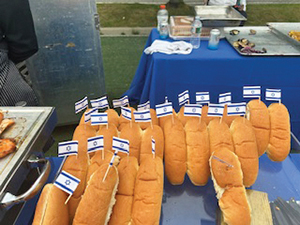
Rabbi Ciner then addressed the audience. “This year has been a time of pain and reflection, similar to Yom HaZikaron, when we all felt the deep sadness for those we have lost. Simultaneously, it has been a year of unity and pride that represents Yom Ha’Atzmaut, celebrating the spirit and resilience of Am Yisrael.
“The Gemara in Ta’anit captures this duality. It teaches us that ‘at a time when Jewish people endure suffering, we must share in their pain.’ This shared suffering bonds us. And yet the Gemara promises in the very next line: ‘Those who connect with the community’s anguish will also share in its redemption and comfort.’ The Magen Avraham, the 17th-century halachic authority, elaborates on this principle, noting that our obligation to empathize is not passive.
“We are called to act—through prayer, tzedaka and personal sacrifice. This year, we have seen the embodiment of these three values in our students. They have raised funds to support the IDF, and have sent over $85,000 to help our chayalim. Your children have davened with great kavanah [concentration], much more so than ever before—for the safety of our soldiers and the return of our hostages. And most remarkably, it has been humbling to witness some of our cherished alumni who have fulfilled personal sacrifice, serving in Tzahal and risking their lives daily. Our wonderful regular teenagers have become heroic soldiers,” Rabbi Ciner said, choking back tears.
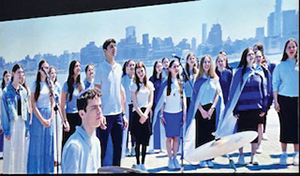
As he concluded, the audience was directed to the screens to watch a video portraying many Frisch graduates currently serving in the IDF. In their green uniforms, they each stated their particular role in the army, and their feelings of pride to be serving.
Rabbi Ciner then introduced the Israeli singer/songwriter Akiva Turgeman, who took to the stage amid thunderous applause. Akiva sang his songs, פשוטים (“We Are Simple”), יש בך כל (“You Have Everything Within Yourself”), לך לך (“Go for Yourself”) and other favorites. Many in the audience knew the words and sang along.
Akiva addressed the audience between songs, speaking in Hebrew. “We are living in a time period that isn’t easy,” he said. “But Am Yisrael is growing stronger, davka—precisely—from the brokenness. We are getting higher and higher. Sometimes we need God to shake us and jolt us in order to remind us that the hope is lying within our togetherness, within our faith. So, I ask you to please allow the music to touch your hearts, and we can have the privilege of getting stronger together.
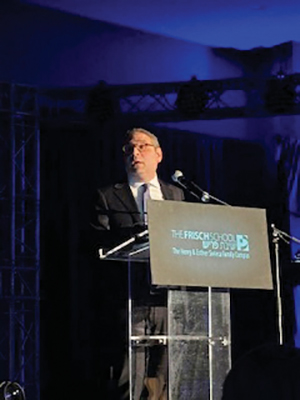
“This year was the hardest Yom Hazikaron of my life,” he continued. “I’m privileged to be part of the miluim of the army. On October 7, they called me from the army, and we had to leave the sefer Torah in the middle of our dancing on Simchat Torah, and we went to war. For five months. We lost friends. Even now at this moment, my brother is in the center of the war, in Rafah, and my other two brothers are in the North, serving in miluim.
“There is a feeling of tremendous pain in Israel right now. I know you feel it here, too. After serving in miluim in this war, it was difficult for me to pick up my guitar again and play. But then I felt that this is my mission—to take the music and to connect us and to elevate us and strengthen us. It’s not simple. To try to create joy on stage, even while I know my brother is in the center of the war.
“But that is the task of a Jew—to hold the matzah and the marror together,” said Akiva. “The Jew has to know how to live in the duality—to hold all the parts of life together.”
